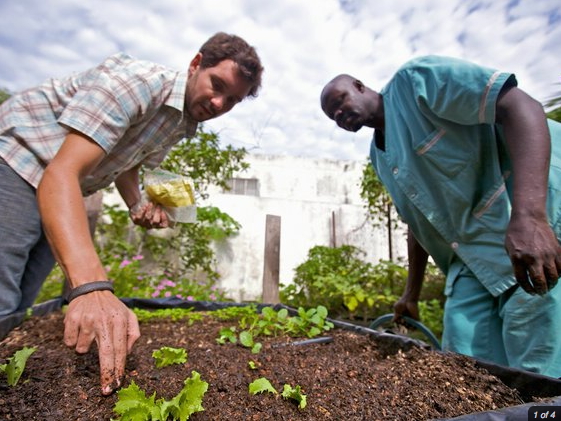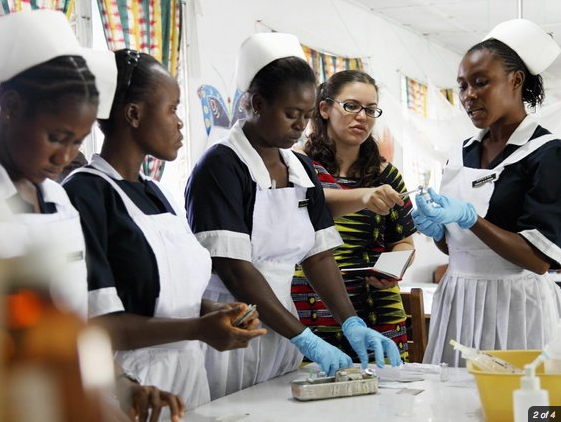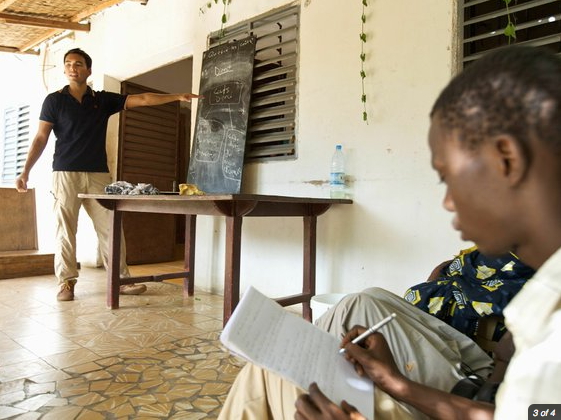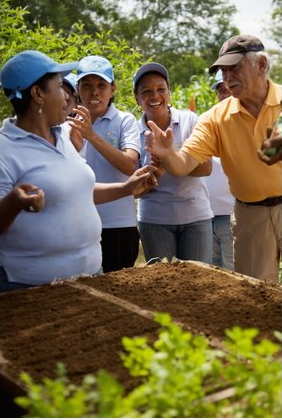
(above) Volunteering with the Peace Corps in places such as Senegal "is a life-defining experience,"
Mr. Field says. PHOTOGRAPHS: PROVIDED BY THE PEACE CORPS
Peace Corps' popularity jumps
November 11, 2009 - Washington Times
Economy may play key role
By Karen Goldberg Goff
The Peace Corps, the volunteer program that emerged from President Kennedy's New Frontier in 1961 to promote international development and good will, is seeing a record number of applications.
The organization received 15,386 applications in fiscal 2009, says spokesman Joshua Field. That is the largest number since the Peace Corps began electronically recording applicants in 1998 and also a record 18 percent increase from 2008. About one-third of applicants are selected for service.
What accounts for the popular resurgence of the New Frontier-era relic? Have President Obama's call to service and efforts to court world public opinion made international volunteerism fashionable again? Or does Peace Corps service represent a rewarding job opportunity in a struggling economy?
Volunteers in Panama (below), Senegal (right) and other places around the world learn useful skills to bring back to their home communities, says Peace Corps spokesman Joshua Field.

Mr. Field says the Peace Corps does not keep track of volunteers' reasons for joining.
"That is part of a larger decision everyone makes," he says. "It is a life-defining experience whether you are 22 years old or 55 years old. You are embarking on a new part of life. You will learn leadership qualities that apply to everyone."
For those who are prepared for the challenge of serving overseas, the Peace Corps can be a life-enriching experience. While each individual has unique personal reasons for joining the Peace Corps, volunteers typically decide to join because of their commitment to public service, Mr. Field says.
He says several factors are probably at work in the applications upsurge. College graduates are growing up in a culture that encourages service, and many have a strong sense of world issues. The post-service benefits, such as career services and graduate school tuition assistance, are also appealing.
There also are more older applicants than ever -- people who volunteer for service at a time when they typically would be thinking about retirement. Mr. Field credits this increase to an "effective outreach campaign" designed "to keep pace with the changing demographics of our nation."
Diana Yan, a 24-year-old State Department employee, will begin a health care assignment with the Peace Corps in Morocco in the spring. She says volunteering with the Peace Corps has been something she has planned on doing since high school.

"I am not sure what my ultimate career goal is," Miss Yan says, "but I have always wanted to help people. Hopefully, this assignment will help me figure out what that means."
Carla Sanchez, 33, of the District, is a Peace Corps volunteer working on dental health promotion in Fiji. She signed up in 2007 after receiving her master's degree in public health, "feeling it would be the best way to add experience to my qualifications," she says in an e-mail from Fiji. "I joined out of a sense of adventure, out of the desire to give back to at-need communities and to experience a different culture."
For all the earnest intentions of volunteers, though, there are some who say the Peace Corps has not kept up with what the locals really need and that it has never really resolved a fundamental ambiguity in its mission.
"The Peace Corps doesn't know if it's a goodwill organization or a development organization," says Robert Strauss, a former Peace Corps volunteer, recruiter and country director. "When it fails to achieve quantifiable development benchmarks, it falls back on the goodwill goal. It doesn't monitor either of these in any scientific, credible way, so pretty much it justifies itself on anecdotal evidence from volunteers. This isn't to say that a lot of good things don't happen. They do. It's just that they are very insignificant when compared to the agency's overall potential."
Mr. Strauss says he is not surprised the Peace Corps is getting a higher number of applications during an economic downturn.
"What would be impressive is if the Peace Corps got a lot of applications during good economic times," he says.
Mr. Strauss says volunteers often are not sent where they are needed most -- and in fact, there is a lot that needs to be done right in the United States.
 (below) A Peace Corps volunteer works with local women in Liberia. About one-third of Peace Corps applicants are selected for service. PHOTOGRAPHS PROVIDED BY THE PEACE CORPS
(below) A Peace Corps volunteer works with local women in Liberia. About one-third of Peace Corps applicants are selected for service. PHOTOGRAPHS PROVIDED BY THE PEACE CORPS
"The appeal of Peace Corps is rooted in the broadly held appeal of wanting to do right by others," he says. "The international aspect of the agency seems to magnify that appeal as people wrongly imagine that it will be easier to make a difference far away from home than it is a block or two off Main Street, USA. It isn't. I encourage anyone thinking about volunteering for the Peace Corps to make sure that they've tried out volunteering at home first."
Mr. Field says part of what Peace Corps volunteers are learning abroad is useful skills to bring back to their home communities.
"Volunteers receive both practical, tangible benefits and a life-defining experience from their service," he says. "Volunteers live and work in other cultures, make significant impacts on local communities, develop invaluable leadership skills and learn a new language. These are important experiences for all Peace Corps volunteers to bring back to their home communities and for young people entering the global marketplace."